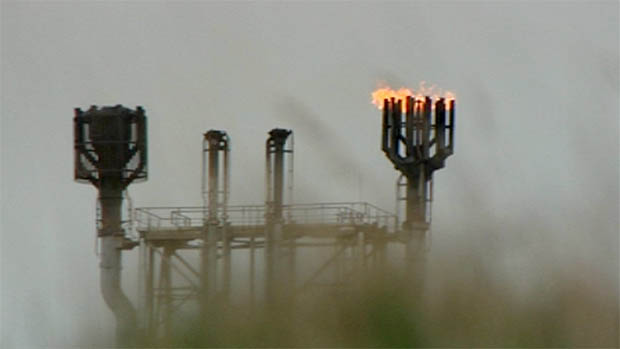After years of delay, are we finally ready to bury carbon?
As the government prepares to announce a new £20m investment in carbon capture research, Science Editor Tom Clarke speaks to one of the key players in the industry – Royal Dutch Shell.
The government is announcing a £20m boost for research into storing planet-warming carbon dioxde from power plants and storing it underground. But the Chairman of Shell UK – a leading player in delivering the technology in Britain – has told Channel 4 News the government must commit much more, much sooner.
Carbon capture and storage (CCS) is currently a key pillar of the government’s energy strategy. Along with more renewable energy and greater energy efficiency, CCS is the only option to allow the UK to continue burning fossil fuels and reduce carbon dioxide emissions to the atmosphere.
However, the government’s strategy for delivering it has been beset with problems. A competition that was designed to encourage companies to bid for part of a £1bn fund to build a demonstration plant by 2020 has now twice failed to select a successful candidate.
Far from being something we can’t afford, I think this is something we can’t afford not to do. Ed Davey
And now the government has been forced to admit that the £1bn has been reallocated and must be spread across future spending review periods. “I think we have to say their record has been pretty patchy so far,” said Tim Yeo MP, Chairman of the Energy and Climate Change Committee.
“I think what we’re looking for is evidence of a clearer commitment and stronger recognition that if we’re going to get into this game at all, we need to do so now.”
The government promises to announce the candidates in the competition within the next few weeks – the one in the lead is oil giant Shell in partnership with Scottish and Southern Energy. They have a proposal to take CO2 from a gas-fired power plant in Peterhead in Scotland and pipe it into a depleted Shell gas-field in the North Sea.

Channel 4 News understands the proposal is a lead contender in the competition, as it should demonstrate whether CO2 from a gas fired plant can be safely stored long-term. As Britain’s ageing coal and nuclear power stations close they are currently being replaced by large numbers of gas-fired plants.
Shell’s offer to build a CCS demonstration plant is on offer for a limited time only. The pipeline the firm is proposing to use will have to be decommissioned by the end of the year if it’s not used to take carbon dioxide out to sea.
“We’re willing to stand behind the project to make it work,” Shell UK Chairman Graham van’t Hoff told Channel 4 News. “What we need from government is clarity on the rules and the process going forward such that we can agree some funding inside 2012.”
A number of bids have already fallen by the wayside and with them some of the industry partners that would be needed to deliver CCS. Last November, a project between Scottish Power and Shell to store CO2 from the Longannet power station in Scotland failed to meet the government’s cost criteria and was abandoned.
Power giant EON had its proposal for CCS at Kingsnorth in Kent turned down by the last government. On Monday, the company announced their plant on that site would be closing. A scheme to store CO2 from Peterhead in a BP gas field in the North Sea was also dismissed.
Above: Shell UK Chairman Graham van’t Hoff on why he’s banking on natural gas with CCs as the future of energy.
On Tuesday, climate change secretary Ed Davey will announce new money for research into some of the trickier aspects of CCS – like the most efficient way of getting CO2 out of the stream of waste gasses leaving a power plant.
But delivering the funding for a full scale CCS demonstration project will be much harder. Not only does the government have to pick a scheme that can be built with the limited funds available but it will have to find a way of running it. Right now, there is no functioning mechanism to pay for burying CO2 under the sea, other than direct subsidy.
“Let’s remember the huge benefits that can acrue for Britain if we’re at the forefront of this new technology,” said Davey. “Far from being something we can’t afford, I think this is something we can’t afford not to do.”
